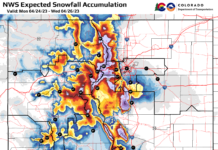by Marissa Lorenz
West Grand addresses Curriculum was an important topic at the most recent meeting of the West Grand School District Board of Directors. Superintendent Dr. Darrin Peppard and Instructional Coach Laura Gore presented a slideshow to Board members and other attendees, briefly discussing the district’s most recent state assessment scores before outlining action steps to bring district-wide curricula and curriculum resources into greater alignment, both between sequential classes and within state standards.
Peppard opened the presentation by saying that “a focus on curriculum, curriculum resources, and alignment with standards in classrooms is a really high priority” for the district at this point in time. He recognized a “concern” about student learning outcomes not being where the district would like. He further attributed the lag in student learning outcomes to a number of different factors and inconsistencies, including recent frequent turnovers in district and school leadership, teaching staff; unaligned curricula and resources; and a lack of curriculum planning.
The superintendent briefly reviewed the 2019 state assessment scores, noting that there “are declines in some areas,” in particular among elementary students, and a “downward trend in student performance, especially in English/ Language Arts.” He indicated that there were some slight increases in middle school results, though still “inconsistent”, but that 11th grade SAT scores were down. He did highlight results of the 9th grade math, where an increase was seen in a group to be the first to have had two consecutive years of the Envisions math curriculum, adopted two years ago. “This is a piece of data that I think supports that, when we build the consistency and have quality resources, we will have really good outcomes,” he stated.
Gore outlined for the Board the work that school leaders have been doing since late last year to place a focus on alignment in curricula. She supported that the work had begun in math, with an attempt to “align vertically and horizontally,” so that curriculum was consistent both between grade levels and within state standards– standards that were updated for 2020. The Colorado Department of Education has stated that districts have two years to review and revise their local standards. And the Colorado Measures of Academic Success (CMAS) assessments– the statewide assessment currently being used by West Grand and most districts in the state– will begin testing new standards in spring of 2021.
Teachers in the district have been working on the transition throughout this year, Gore said, and indicated that teachers had already completed three of four training workshops, to total 10 hours in all, in order to address better mapping of 2020 standards to curriculum, the analysis of gaps and overlaps in the current curriculum, the alignment of curriculum and resources, and high-impact instructional strategies. The last workshop will take place in March, when instructional practices and needed resources will be discussed. She was positive about the work so far, stating that “we have scope and sequence aligned. Now we need to talk about, how are we teaching? What are we using to teach?”
She gave examples of curriculum inconsistencies, noting that there were 15 different resources being used for reading instruction in the elementary grades. “We need consistency in literacy instruction district-wide; we need research-based curriculum.”
Peppard picked up on this thread, saying that the initial step was to find the “right resources” and work on procuring them. That is the foundation of what he presented to the Board as a three-year plan, where a “critical look” would be given to resource needs in order to identify the “big needs each year,” such as consistent sequential curricula for language arts, science, and social studies. For next year’s budget, he indicated that they would likely be looking at a high school math and district-wide language arts needs, and “maybe one other smaller need.”
However, he said, in the long-run, they were looking at options other than just buying text books. “A text book isn’t a curriculum,” he reminded. “The scope, sequence, standards, and all of the resources together make up the curriculum.” He expressed an interest in researching open source resources, looking for “quality, less cost, and online” options. And even mentioned the possibility of the district designing certain curricula of their own. He noted that Gore and some other teachers would likely be visiting other districts in the state that had accomplished this, such as Craig, in Moffat County, who have developed a successful science curriculum.
Peppard told the School Board that they hoped to present any curriculum resources chosen for purchase with the 2020-2021 budget at the regular April meeting for review and then ask for final approval for purchase in May. Other staff present supported the three-year plan and Board members seemed supportive of pursuing updates to curricula
and resources in the near future.









